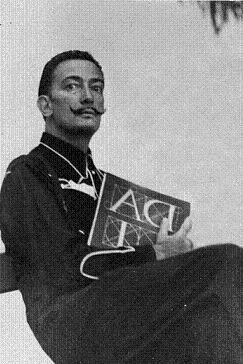Worn out by the holidays? Try a Dali nap
If running around shopping and visiting loved ones is causing fatigue this holiday season, a Salvador Dali nap might be the key to feeling refreshed.
In his book, “50 Secrets of Magic Craftsmanship,” Dali describes his tried-and-true method of quick naps to “resolve the problem of ‘sleep without sleeping.'” All that is needed is a chair (Dali recommends a bony, Spanish-style armchair), a heavy key and a plate. Dali calls this “slumber with a key.”
He says to first place the plate upside-down on the floor. Sit in the chair with your head tilted back and the key held delicately between two fingers above the plate. From there, let yourself relax and drift to sleep.
When you drift off, the key will fall and clatter against the plate, ensuring that you will wake up. Dali says this will give you the perfect amount of sleep “for your whole physical and psychic being to be revivified.”
In an exert from Dali’s book, the artist specifies how long this nap should be:
“Know, therefore, that your afternoon sleep must last less than a minute, less than a quarter of a minute, since, as you will immediately realize, a mere second is infinitely too long.”
The surrealist says anything more than this small siesta will hinder one’s work, and they’ll be enslaved by their heaviness the rest of the afternoon.
Dali isn’t the only one to have used this type of quick napping, which is now known as hypnagogic napping. The list includes Albert Einstein, Aristotle, Beethoven, Issac Newton, Thomas Edison and Nikola Tesla as people who napped for a creativity boost.
Hypnagogia refers to the transition from wakefulness to sleep. Not only does it open the mind to creative thoughts, but a study in 2001 by Harvard psychologist Deidre Barrett showed that this state is especially helpful for solving problems.
Aside napping tips, Dali even provided ideas on how to control dreams when one is sleeping for more than his recommended 15 seconds. He suggests the following:
1. Choose carefully the fragrances and perfume which evoke concrete periods of your adolescence. Have your valet pour one of these fragrances or perfumes on your pillow one hour before you awake, and the time, situation or the persons associated with that fragrance will appear in your dreams.
2. What I have said about perfumes also applies to music. A melody associated with a memory or a being will evoke that memory or being in your dream if the melody is played quietly while you sleep.
3. A very intense light on our pupils, or a gradual pressure upon them by an appropriate pneumatic apparatus, will make you dream in colors.






